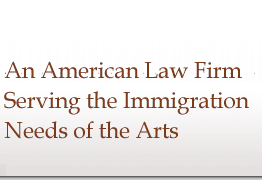 |
 |
 |
 |
 |
 |
| |
Getting Started |
| |
HOW CAN WE HELP YOU At VisasForDancers, our clients range from American arts organizations who want to bring foreign artists to work or study in the U.S. to foreign troupes who wish to perform in the U.S. and individual citizens from other countries who want to work in America.
The two most common forms of temporary work visas we pursue for performing artists are the O Visa for individuals and the P Visa for groups. For artists seeking to live permanently in the U.S., we provide assistance in securing the required “Green Card” or Lawful Permanent Resident status. In some cases, we assist artists already permitted to work in the U.S. who want to obtain visas for family members or a fiancée. We also serve clients seeking to become U.S. citizens. Please note that student visas are issued by U.S. schools that have been approved by the U.S. immigration authorities.
To conduct an initial evaluation of your personal needs, free-of-charge, we ask you to provide us with the following information:
For Arts Organizations: Simply provide some basic background information about your group and your needs, and we will follow up with you.
For Individuals, Tell Us About You. Please include a brief description of your immediate goal(s), such as getting an O-1 visa for performing with an U.S. company for a year, and/or any longer term goals, such as getting a “Green Card” and living permanently in the US. We will also need a copy of your resume, preferably in PDF format, and answers to the questions below. All this can be done easily via email.
- In which country were you born?
- In which country do you live now?
- Do you have one or more passports, and if so, from what country or countries?
- What is the name on your passport(s)?
- Have you ever been to the U.S., and if so when and for what reasons?
- Have you ever worked in the U.S.? If so, how, if at all, were you paid?
- What kind of U.S. visas have you had in the past?
- Do you currently have a U.S. visa? If so, what type and when does it expire?
- Have you ever had a U.S. visa or other U.S. immigration application denied, been denied entry into the U.S. or been required to leave the U.S. by the U.S. immigration authorities?
|
 |
| |
OUR GOAL IS TO SERVE YOUR INTERESTS IN A COST EFFECTIVE WAY: VisasForDancers only takes clients we believe we can help in a cost-effective fashion. Because filing and legal fees are substantial and non- refundable, we do not file applications unless we believe you have a reasonable expectation of meeting the criteria for the status you seek. Please note, however, that the US immigration authorities have very broad discretion and we cannot guarantee that your application will be granted. |
 |
| |
GOOD COMMUNICATION IS CRITICAL: Honest and open communication in any client-attorney relationship is key to a positive outcome. To be successful, your lawyer must be told ALL the facts from the start – even those you feel may not help or are embarrassing. That is why anything you tell us is subject to the “attorney-client privilege,” which means that by law we must hold it strictly confidential unless and until you give us permission to share your information with others.
For our relationship to work, candid and direct communication must flow in both directions. You should feel comfortable asking questions about our training and experience, how we work and which lawyer will do which parts of your work. It is especially important for you to ask any and all questions you have about our legal fees. If you decide to retain us, we want you to feel free to ask what is happening with your case and why. ;Fortunately, e-mail enables us to correspond easily, in a timely fashion, around the world. |
 |
| |
TIMING. Perhaps the most frustrating aspect of the current U.S. immigration system is the long waits for processing applications. Unless one pays an additional $1,000 for “premium” processing, large “backlogs” in the system can delay initial substantive review of an O-1 visa application for many months. Currently, immigrant (“Green Card”) applications can take several months to a year and sometimes longer. However, if the applicant is in the U.S. when the Green Card application is filed, he or she may be able to get temporary authorization to work within three to six months after they file their Green Card application. The time for processing applications varies and can change from month to month based on workloads at the various government processing centers. While we will give you our best estimate at the time your application is actually filed, we are not able to guarantee the actual processing time. |
 |
| |
FILING FEES. : Filing fees for all immigration applications are set by the U.S. government, and they are not refundable even if the application is denied. Currently, the filing fee for a regular O-1 visa is $320.00. If the visa is needed in weeks – not months – you have the option of paying an extra fee of $1,000 for “premium” processing. The current filing fee for a “Green Card” and related interim work authorizations is $1,835.00, if no Department of Labor Certification is required. Currently the U.S. immigration authorities have suspended the “premium processing” option for Green Cards. Other filing and processing fees may apply in some cases. |
 |
| |
LEGAL FEES: VisasForDancers normally charges a fixed fee for a particular kind of work, which is in addition to government filing fees. We do our best to keep our fees affordable for individual artists and our research shows that our rates are lower than those charged by immigration law firms with lawyers of similar standing. Of course, we will be happy to discuss fees to help you decide whether to retain us and we welcome your questions on the subject. .
Our usual fee for an O-1 visa is $2,000 and for a “Green Card” it is $5,000 (with a $1,000 discount if you have a current O-1 visa and we have access to the entire application that was submitted to obtain that visa). Typically fees are due in full at the time your application is prepared and are not refundable even if the application is denied . In some cases, particularly for arts organizations, hourly fees or a negotiated retainer may be more appropriate. Again, we are more than happy to discuss fee issues with all clients. |
 |
| |
back to top |
| |
|
|
 |
|





